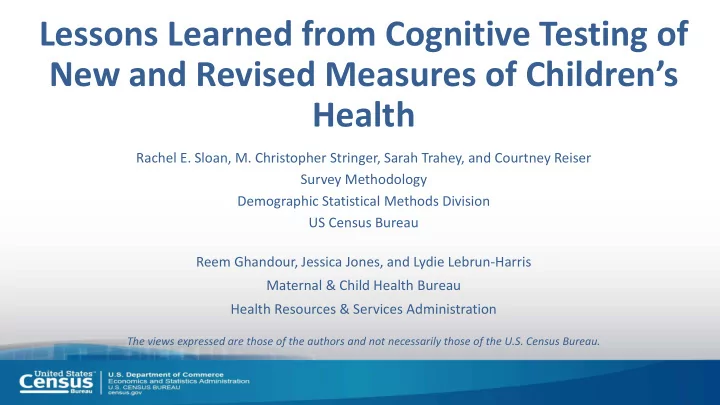

Lessons Learned from Cognitive Testing of New and Revised Measures of Children’s Health Rachel E. Sloan, M. Christopher Stringer, Sarah Trahey, and Courtney Reiser Survey Methodology Demographic Statistical Methods Division US Census Bureau Reem Ghandour, Jessica Jones, and Lydie Lebrun-Harris Maternal & Child Health Bureau Health Resources & Services Administration The views expressed are those of the authors and not necessarily those of the U.S. Census Bureau.
Background of the National Survey of Children’s Health (NSCH) NSCH is sponsored by the Maternal & Child Health Bureau (MCHB). The survey assesses a wide range of children’s health measures. Respondents are asked about their child’s physical and mental health, emotional well-being, education, and developmental milestones. The NSCH also asks about the child’s household, including demographics of parents or caregivers.
Background of the NSCH Respondents complete a screener questionnaire about all children in the household. Only one child per household is selected for the topical questionnaire. There are three topical questionnaires, one for each of the following age groups: 0-5 6-11 12-17 Most questionnaire content is the same across the three topical questionnaires, however there are some different questions based on the sample child’s age.
Methods Conducted an expert review of new items and those of particular interest to MCHB. Conducted a reading level assessment (Flesch-Kincaid) Limited utility since medical terms increase reading level and cannot be replaced (ex. diabetes). Cognitive interviewing Conducted 53 interviews across two rounds using both web and paper. Cognitive interviews were conducted from September to December 2019, and took place in Northern Virginia, Washington DC, Baltimore, MD, and Flagstaff, AZ. Used quotas to interview participants with children across the three age groups. Recruitment efforts focused on topics of interest (ex. Children who have suffered concussions, unique caregiver situations, etc.)
Selected Findings and Recommendations – Gender Neutral Language Tested the use of gender neutral pronouns to refer to the sample child. Used the pronouns “they” instead of “he or she” and “their” instead of “his or her”. Most participants did not notice that gender neutral pronouns were used until it was mentioned during the debriefing. The response to the gender neutral pronouns was positive, with some participants saying that the revised language was more inclusive. There were no negative reactions to the gender neutral pronouns.
Selected Findings and Recommendations – Brain Injury Questions MCHB and the Census Bureau revised the existing brain injury questions to capture instances where the caregiver suspected a brain injury but did not seek medical care. A new definition was added, to clarify what types of injuries were included in the question. The revision performed well in testing, and was approved for the 2020 NSCH. Before After
Selected Findings and Recommendations – Second Caregiver Question The questionnaire allows for up to two parents or caregivers to be reported. 2019 data indicated that single caregivers were often reporting themselves as both the first and second caregiver. The Census Bureau tested a new filter question, as well as revised question language. Both performed well and were implemented in the 2020 questionnaire. Before After
Future Research Research for 2020: New items, on nutrition, physical activity, and discrimination based on physical ability. Possible revisions to existing items, including sources of medical care, vision screenings, and hospital stays. Research Beyond 2020: MCHB is planning an overhaul of the questionnaire section that covers physical and mental health conditions to address some issues that could not be resolved during these two rounds of cognitive testing. For example, some participants were confused about the differences between some conditions, such as intellectual disability and learning disability.
Thank you US Census Bureau Maternal and Child Health Bureau Rachel E. Sloan Reem Ghandour rachel.e.sloan@census.gov rghandour@hrsa.gov M. Christopher Stringer Jessica Jones m.christopher.stringer@census.gov jjones2@hrsa.gov Sarah Trahey Lydie Lebrun-Harris sarah.s.trahey@census.gov lharris2@hrsa.gov Courtney Reiser courtney.n.reiser@census.gov The U.S. Census Bureau reviewed this data product for unauthorized disclosure of confidential information and approved the disclosure avoidance practices applied to this release. CBDRB-FY20-167
Recommend
More recommend